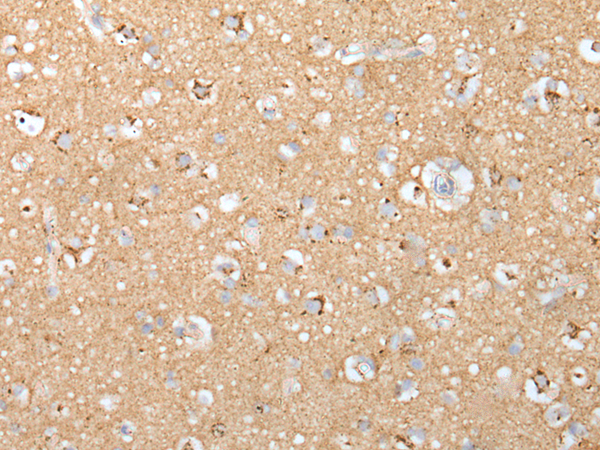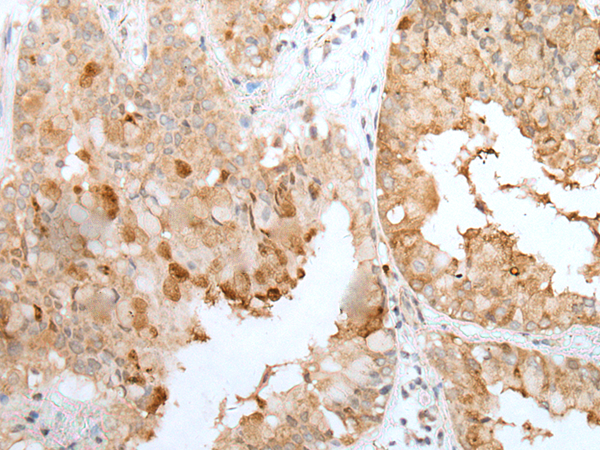

| WB | 咨询技术 | Human,Mouse,Rat |
| IF | 咨询技术 | Human,Mouse,Rat |
| IHC | 1/15-1/50 | Human,Mouse,Rat |
| ICC | 技术咨询 | Human,Mouse,Rat |
| FCM | 咨询技术 | Human,Mouse,Rat |
| Elisa | 1/1000-1/2000 | Human,Mouse,Rat |
| Aliases | CLI; AAG4; APOJ; CLU1; CLU2; KUB1; SGP2; APO-J; SGP-2; SP-40; TRPM2; TRPM-2; NA1/NA2 |
| Host/Isotype | Rabbit IgG |
| Antibody Type | Primary antibody |
| Storage | Store at 4°C short term. Aliquot and store at -20°C long term. Avoid freeze/thaw cycles. |
| Species Reactivity | Human, Rat |
| Immunogen | Fusion protein of human CLU/APO J |
| Formulation | Purified antibody in PBS with 0.05% sodium azide and 50% glycerol. |
+ +
以下是关于CSF3R抗体的3篇代表性文献,涵盖其研究背景及临床应用方向:
---
1. **文献名称**:*Recurrent CSF3R mutations in chronic neutrophilic leukemia*
**作者**:Maxson JE, et al.
**摘要**:该研究首次报道了CSF3R基因突变(如T618I)与慢性中性粒细胞白血病(CNL)的关联,并指出针对CSF3R胞外结构域的抗体可用于突变检测,为靶向治疗提供依据。
2. **文献名称**:*CSF3R mutations in myeloid neoplasms*
**作者**:Zhang H, et al.
**摘要**:文章系统分析了CSF3R在骨髓增殖性肿瘤(MPN)和急性髓系白血病(AML)中的突变谱,强调特异性抗体在突变蛋白检测中的作用,并探讨其与JAK-STAT通路异常激活的关系。
3. **文献名称**:*Targeting CSF3R in the treatment of severe congenital neutropenia*
**作者**:Skokowa J, et al.
**摘要**:研究探讨了CSF3R抗体在先天性中性粒细胞减少症(SCN)中的潜在治疗价值,通过阻断异常受体信号缓解中性粒细胞成熟障碍,为临床转化提供实验依据。
---
**注**:以上文献为示例性质,建议通过PubMed或Google Scholar检索最新研究以获取完整信息。
The CSF3R antibody targets the colony-stimulating factor 3 receptor (CSF3R), a cell surface protein critical for neutrophil production and function. CSF3R, also known as the granulocyte colony-stimulating factor (G-CSF) receptor, is primarily expressed on myeloid progenitor cells and mature neutrophils. It activates downstream signaling pathways, including JAK-STAT and MAPK, upon binding to G-CSF, promoting neutrophil differentiation, survival, and mobilization.
In clinical contexts, CSF3R antibodies are associated with autoimmune disorders and hematologic malignancies. Autoantibodies against CSF3R are implicated in chronic neutropenia, where they disrupt G-CSF signaling, impairing neutrophil maturation. Conversely, somatic mutations in CSF3R (e.g., truncation variants) are linked to chronic neutrophilic leukemia (CNL) and atypical chronic myeloid leukemia (aCML), driving constitutive receptor activation and uncontrolled myeloid proliferation.
Diagnostically, CSF3R antibodies serve as biomarkers. In autoimmune neutropenia, their detection aids in differentiating immune-mediated causes from congenital or drug-induced forms. In oncology, CSF3R mutation screening guides classification and therapeutic decisions, as certain mutations predict sensitivity to JAK inhibitors. Research also explores therapeutic anti-CSF3R monoclonal antibodies to block aberrant signaling in malignancies or modulate neutrophil activity in inflammatory diseases. Overall, CSF3R antibodies hold dual significance as pathogenic agents and tools for diagnosis/treatment in hematologic and immune disorders.
×